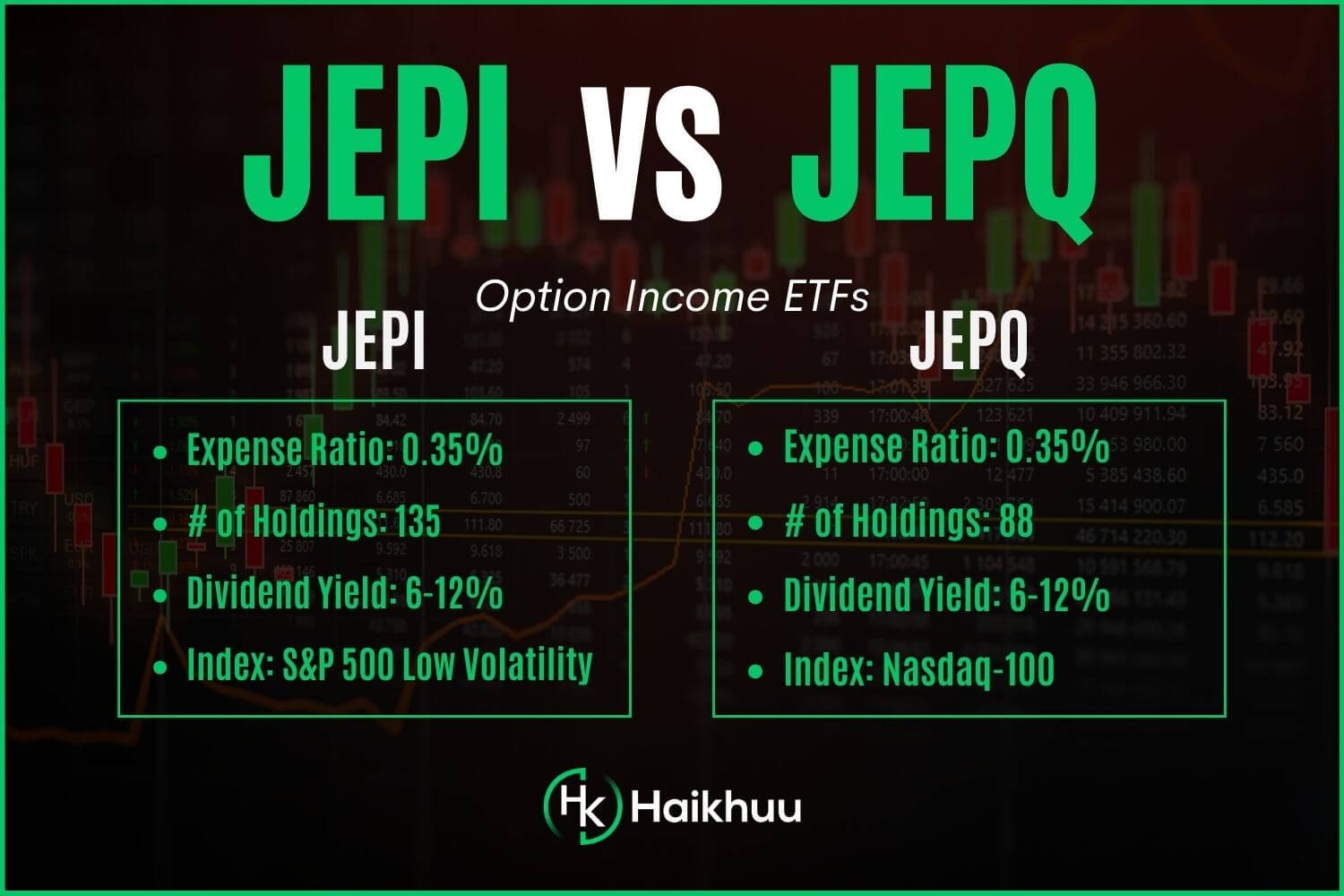
When comparing JEPI vs JEPQ, investors are looking at two powerful tools in the world of exchange-traded funds (ETFs). Both the JPMorgan Equity Premium Income ETF (JEPI) and the JPMorgan Nasdaq Equity Premium Income ETF (JEPQ) offer unique strategies that attract income-focused investors. While they aim to provide regular income, they also serve different purposes and can fit into your investment portfolio in different ways.
Understanding the differences between JEPI vs JEPQ is crucial for making informed decisions. JEPI, which focuses on the broader market, was launched in 2020 and has attracted a lot of attention for its steady income. On the other hand, JEPQ debuted in 2022 and targets the tech-heavy Nasdaq, making it an attractive choice for those looking to tap into the growth of technology stocks while still seeking income.
Understanding JEPI vs JEPQ: Key Differences Explained
When looking at JEPI vs JEPQ, it is important to know that these two ETFs (exchange-traded funds) have different focuses. JEPI is designed to give steady income by investing in many companies across the stock market. It aims to help you earn a good return with less risk. Meanwhile, JEPQ focuses more on technology stocks, especially from the Nasdaq. This makes it exciting for investors who want to tap into the tech world while still earning money.
Both funds use special strategies called options to limit losses. This means they can help protect your investment if the market goes down. However, it is essential to remember that there are risks involved. Investors can still lose money. Understanding how these funds work can help you decide which one fits your needs better.
Income Goals: What Can You Expect from JEPI and JEPQ?
When thinking about JEPI vs JEPQ, income is a big factor. JEPI aims for an income return of 7% to 9%. This can be appealing for people who want regular cash flow. The goal is to provide reliable earnings that can be used for living expenses or reinvested.
On the other hand, JEPQ has a higher income target of 9% to 11%. This higher target can attract investors looking for more money, but it may come with increased risk. It is important to weigh these factors before making a choice. Here are some key points to remember:
- JEPI: Aims for 7% to 9% income.
- JEPQ: Targets 9% to 11% income.
Choosing the right one depends on how much risk you are willing to take. More income can sound great, but it may not be worth it if you are not comfortable with the risk.
Investment Strategies: How JEPI and JEPQ Use Options to Mitigate Risk
One of the exciting parts of JEPI vs JEPQ is how they use options. Options are financial tools that let you buy or sell stocks at specific prices. By using options, these funds can protect against big losses. This is especially helpful during market drops when other investments might struggle.
Using options can help in several ways:
- Limit Losses: Protects your investment when stocks fall.
- Boost Income: Helps generate income through option premiums.
Both funds follow this strategy, but the results may differ based on the types of stocks they invest in. JEPI is more diverse, while JEPQ sticks closely to tech stocks. This means that investors should consider their own risk tolerance and investment goals when looking at these options strategies.
Market Performance: Comparing Year-to-Date Returns of JEPI and JEPQ
When evaluating JEPI vs JEPQ, looking at their market performance is key. Year-to-date, JEPI is up about 6.24%, while JEPQ has risen by 15%. This shows that JEPQ is currently performing better than JEPI. Many investors may wonder why this is the case.
The answer often lies in the types of stocks they hold. JEPQ focuses on the tech sector, which has seen rapid growth. Tech companies are often very popular and can offer strong returns. JEPI, while still good, is more balanced across different sectors. This means it might not grow as quickly as tech-heavy JEPQ.
Risk Management: Is JEPI or JEPQ Better for Conservative Investors?
For those who are careful with their money, understanding risk management in JEPI vs JEPQ is vital. JEPI is known for being less volatile. This means it does not swing up and down in price as much. Investors who want a safer option might prefer JEPI because it tends to be steadier.
Conversely, JEPQ can offer higher potential returns, but it also comes with more risk. The technology sector can change rapidly. Here are some factors to consider:
- JEPI: Better for conservative investors seeking stability.
- JEPQ: More suitable for those who can handle higher risks for potential growth.
Knowing your comfort with risk can help you choose the right fund for your needs.
Conclusion
In conclusion, when thinking about JEPI vs JEPQ, it’s important to know what you want from your investments. If you like the idea of getting steady income with less risk, JEPI might be a good fit for you. It aims for a balanced approach and helps protect your money when the market gets bumpy. This can make it easier for you to feel secure about your choices.
On the other hand, if you’re excited about the tech world and want to try for higher income, JEPQ could be the way to go. It has the potential for bigger returns but comes with more ups and downs. By understanding these differences, you can make the best choice for your own financial goals. Always remember to think carefully about what works best for you!







